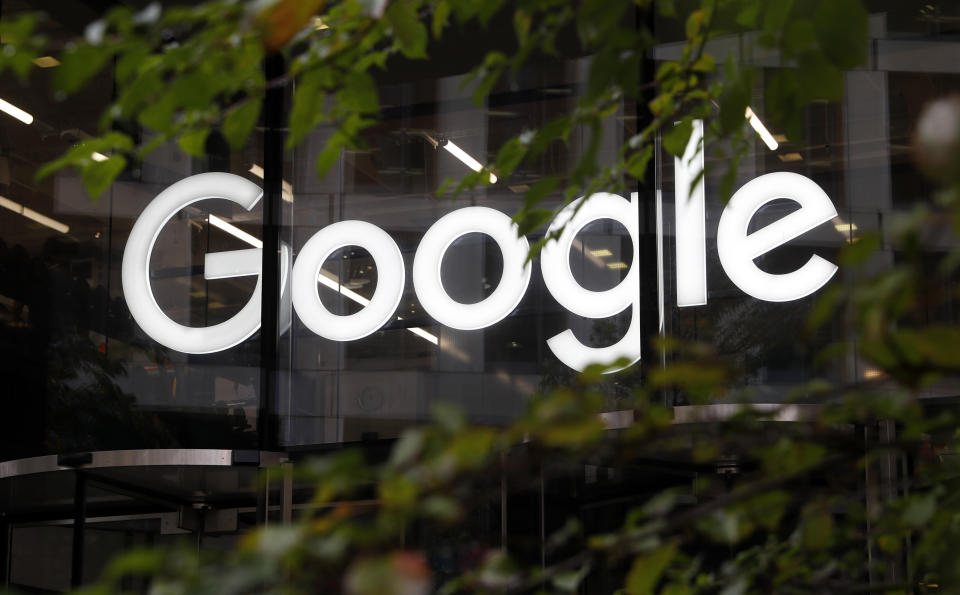Alphabet's first-quarter sales fall short of expectations
Alphabet (GOOG, GOOGL) missed expectations for first-quarter revenue as Google’s advertising sales came up light, sending shares lower in extended trading.
Google’s parent company posted revenues of $29.48 billion, excluding traffic acquisition costs (TAC), for the quarter ending in March. This fell short of expectations for just over $30 billion in revenue excluding TAC, according to Bloomberg-compiled estimates. Adjusted earnings were $11.90 per share on a diluted basis excluding a one-time fine, exceeding expectations for $10.17 per share.
TAC, which represent the sum that Google pays to websites and mobile partners to bring consumers to their platform, rose to $6.86 billion in the first quarter. However, TAC as a percentage of revenue declined to 22%, down 200 basis points from the year-ago quarter.
Ahead of results, Alphabet noted that its first-quarter results would be impacted by the European Commission’s $1.7 billion fine on Google for deals with its search partners that were found to have violated European competition laws.
Alphabet also reported lower-than-expected first-quarter revenue in Google’s advertising segment, which comprises the lion’s share of overall sales. Advertising revenue for the period was $30.72 billion, lighter than the $32.64 billion expected and the $32.6 billion the company posted during the fourth quarter of 2018.
Shares of Alphabet declined 7.19% to $1,195 each as of 5:16 p.m. ET.
Cost-per-click for Google’s properties – which represents the amount that Google earns for each user click – declined 19% on a year-over-year basis. On a call with investors after results were released, CFO Ruth Porat attributed this in part to a decline in the rate of click growth in YouTube, due to changes in the product over the past year.
Google’s advertising revenue was set to be a key focus in Alphabet’s first-quarter results after other internet giants including Facebook (FB), Twitter (TWTR) and Snap (SNAP) in their own earnings reports suggested advertising marketing remained strong in the first-quarter. For Amazon (AMZN) – one of Google’s biggest advertising competitors – growth in its “other” segment comprising mostly advertising sales slowed year-over-year, increasing 36% to $2.72 billion.
Operating margin, including the fine, contracted to 18% in the first quarter, down from the 21% margin the company posted in the fourth quarter. However, excluding the impact of the fine, operating margin improved quarter-over-quarter to 23%.
While investors were hoping Alphabet would show signs that its margins were stabilizing after the gauge of profitability declined year-over-year in the fourth quarter, many analysts were skeptical the company would report major improvements on this front in the first quarter.
“Margin pressure reflects investments in growth. As with most of our other large cap Internet companies, Alphabet is prioritizing platform investment over harvesting earnings,” Baird analyst Colin Sebastian, who rates shares of Alphabet as Outperform, wrote in a note ahead of earnings results. “We note that significant opportunities still remain across cloud, video, hardware, and even core search.”
Alphabet has recently leaned on its advertising sales to offset investments in the development of lower-margin businesses like YouTube, the cloud and hardware.

CEO Sundar Pichai has previously called YouTube a central element to Alphabet’s long-term strategy as the company expands its over-the-top YouTube TV service and monetized, ad-free YouTube Premium offering. Building out these services, however, also generates a major source of content acquisition costs in the quarter, Porat said, reiterating a similar theme from February. Alphabet does not break out specific financial details about YouTube in its earnings report, and instead embeds these results in its Google segment results.
Alphabet has also embarked on new initiatives to expand its cloud services offerings, both in the enterprise cloud and consumer-facing space. On a call with investors Monday afternoon, Porat called the cloud segment “one of the fastest-growing businesses at Alphabet.”
In March, the company announced a cloud-based gaming platform called Google Stadia, which will require no console or game downloads and is slated to launch sometime in 2019.
“With YouTube being the ‘lobby’ for game access and Stadia offering the ability to push to connect to games from YouTube, Stadia could be a tailwind to YouTube engagement and monetization,” Bank of America Merrill Lynch analyst Justin Post wrote in a note when Google Stadia was announced in March.
—
Emily McCormick is a reporter for Yahoo Finance. Follow her on Twitter: @emily_mcck
Follow Yahoo Finance on Twitter, Facebook, Instagram, Flipboard, LinkedIn, andreddit.
Read more from Emily:
Tech companies like Lyft want your money – not ‘your opinion’
Levi Strauss shares jump more than 30% above IPO price at open
Facebook sued by Trump administration for alleged ‘discriminatory’ ad practices
Boeing 737 Max groundings ‘pressure’ U.S. economic data: Wells Fargo
